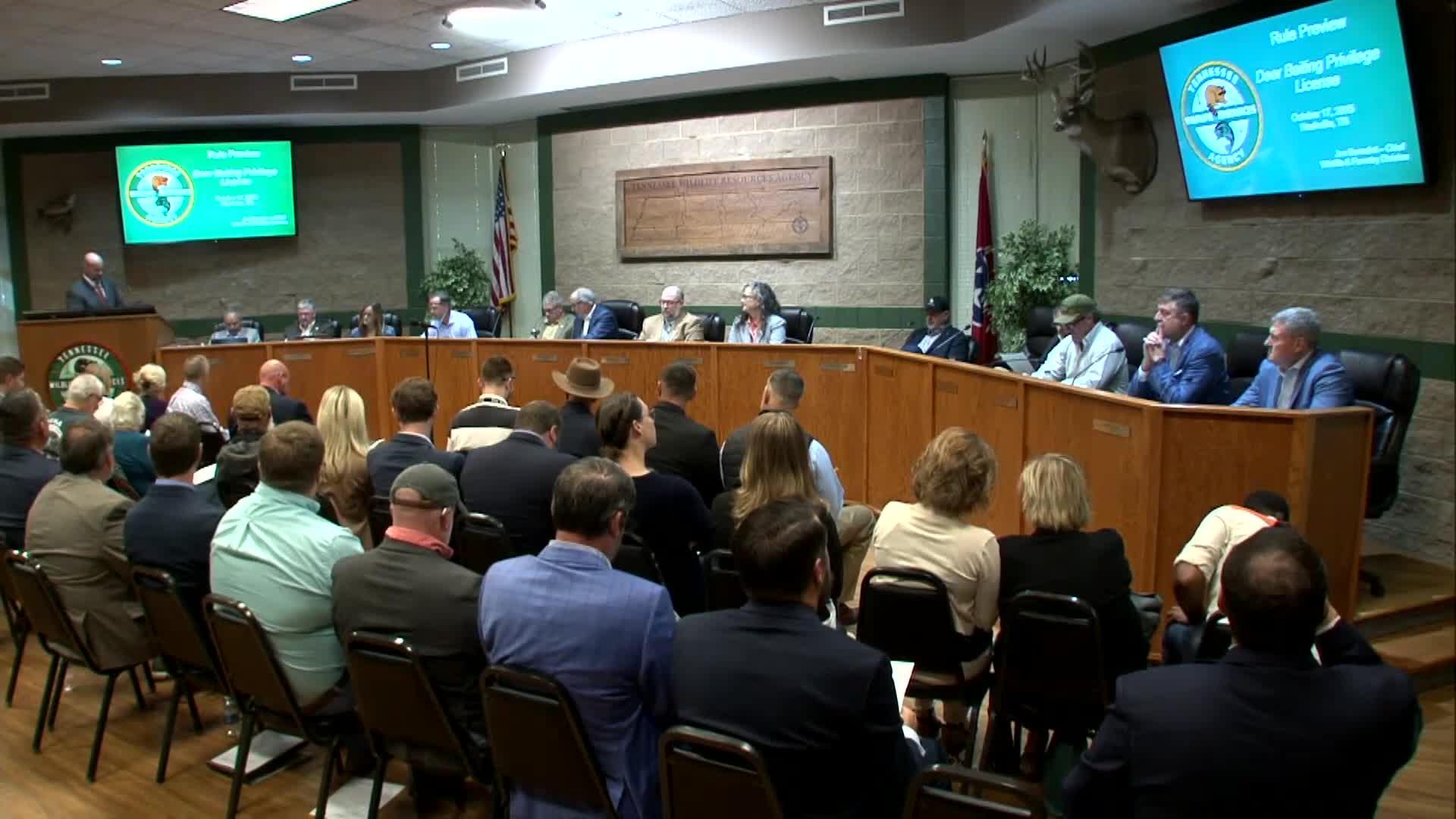TWRA previews new North Cumberland OHV permit, draws business and rider concerns
Get AI-powered insights, summaries, and transcripts
Subscribe
Summary
The Tennessee Wildlife Resources Agency presented draft rules to require a vehicle-level off-highway-vehicle (OHV) permit for riding on North Cumberland Wildlife Management Area, including a phased fee schedule; local businesses and rider groups told commissioners the proposed multi‑year increases could hurt reservations and regional economies.
The Tennessee Wildlife Resources Agency on Wednesday previewed a proposed off-highway-vehicle permit for North Cumberland Wildlife Management Area that would require a vehicle-level permit and set a multi-year, phased fee structure intended to fund road, trail and stream‑crossing repairs.
The agency’s presentation said staff estimates it would take roughly $6 million to complete needed trail and roadwork at an “optimal” level; earlier engineering and maintenance estimates cited per‑mile and culvert/bridge costs and show wide ranges depending on scope. “When this group came together in 2022, we knew that the OHV program had grown exponentially over the years since it started in early 2 thousands,” Brandon Ware, who led the presentation for TWRA, told the commission.
TWRA said the draft would change two rules: the license-and-permit rule to create a specific North Cumberland OHV permit section and the WMA rules to require the permit for OHV riding at North Cumberland. Under the draft, a hunting-and-fishing license or WMA permit would no longer suffice for OHV riding there; lifetime/sportsman licenses would require a $40 supplemental permit. The agency said the permit is per vehicle (at least one adult per vehicle) and a separate guide license would be required for paid guiding.
The commission discussed price points that staff and allied groups previously negotiated: a three-year graduated annual permit plan that would reach the agency’s originally proposed level in year three. TWRA described surveying work by the University of Tennessee that estimated about 30,000 unique users per year (roughly 15,000 OHVs), about 70% nonresidents, average of six trips annually and roughly two people per vehicle — statistics staff said were used to model likely revenues under various fee structures.
The draft opened a public comment period the same day and runs through Nov. 14, TWRA said. The agency has also proposed publicity and outreach steps, including media announcements, website notices and inclusion in the hunting guide to alert long‑time riders to the change in licensing requirements.
Local businesses and rider‑association representatives told the commission they oppose publishing the second‑ and third‑year price increases now, saying doing so suppressed reservations last year when earlier proposals were publicized. “Last year during the proposed increase, our reservations dropped by 40% in January,” said Sheila Westray, a Campbell County business owner and CORA board member. She asked the commission to approve only the first‑year rate now and delay publication of later increases.
A letter read into the record from Justin Jones, owner of Ride Royal Blue ATV Resort and Campground, said his facility saw a 40% revenue drop in the first quarter following prior publicity about a proposed increase and recommended lower annual price points and tying future increases to the consumer price index.
Commissioners repeatedly emphasized the need to balance resource maintenance with the local economic impact of fee increases. “If you go from whatever the number is now to $300 next year and $400 the next year and $500 next year, that’s pretty significant,” Commissioner Monty Blue said, asking staff to consider competition in neighboring states. Commissioner Chip Saltzman urged a focused outreach effort so long‑time users understand the new requirement: “If you say we put it on the website, that ain’t gonna cut it.”
TWRA staff said the funding model is explicit: program revenues must be used for OHV program costs and cannot be diverted. Staff also noted that lower permit revenue would reduce the number of miles and features they could maintain. The commission did not vote on the OHV permit at the meeting.
The agency requested public comment through Nov. 14 and said staff will return with a rule proposal and additional outreach plans ahead of any final action expected at a future commission meeting.
Ending: The commission left the draft open for comment and asked staff to study economic impact information, outreach strategies and enforcement/grace‑period procedures before a December or later vote.
